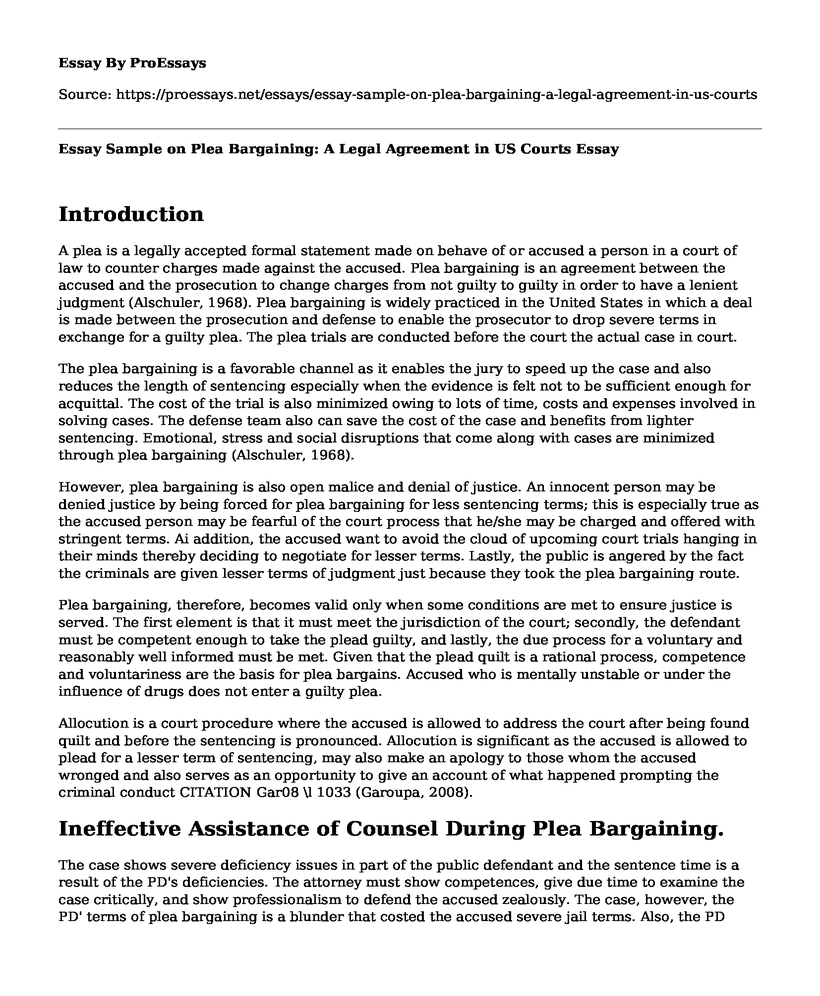Introduction
A plea is a legally accepted formal statement made on behave of or accused a person in a court of law to counter charges made against the accused. Plea bargaining is an agreement between the accused and the prosecution to change charges from not guilty to guilty in order to have a lenient judgment (Alschuler, 1968). Plea bargaining is widely practiced in the United States in which a deal is made between the prosecution and defense to enable the prosecutor to drop severe terms in exchange for a guilty plea. The plea trials are conducted before the court the actual case in court.
The plea bargaining is a favorable channel as it enables the jury to speed up the case and also reduces the length of sentencing especially when the evidence is felt not to be sufficient enough for acquittal. The cost of the trial is also minimized owing to lots of time, costs and expenses involved in solving cases. The defense team also can save the cost of the case and benefits from lighter sentencing. Emotional, stress and social disruptions that come along with cases are minimized through plea bargaining (Alschuler, 1968).
However, plea bargaining is also open malice and denial of justice. An innocent person may be denied justice by being forced for plea bargaining for less sentencing terms; this is especially true as the accused person may be fearful of the court process that he/she may be charged and offered with stringent terms. Ai addition, the accused want to avoid the cloud of upcoming court trials hanging in their minds thereby deciding to negotiate for lesser terms. Lastly, the public is angered by the fact the criminals are given lesser terms of judgment just because they took the plea bargaining route.
Plea bargaining, therefore, becomes valid only when some conditions are met to ensure justice is served. The first element is that it must meet the jurisdiction of the court; secondly, the defendant must be competent enough to take the plead guilty, and lastly, the due process for a voluntary and reasonably well informed must be met. Given that the plead quilt is a rational process, competence and voluntariness are the basis for plea bargains. Accused who is mentally unstable or under the influence of drugs does not enter a guilty plea.
Allocution is a court procedure where the accused is allowed to address the court after being found quilt and before the sentencing is pronounced. Allocution is significant as the accused is allowed to plead for a lesser term of sentencing, may also make an apology to those whom the accused wronged and also serves as an opportunity to give an account of what happened prompting the criminal conduct CITATION Gar08 \l 1033 (Garoupa, 2008).
Ineffective Assistance of Counsel During Plea Bargaining.
The case shows severe deficiency issues in part of the public defendant and the sentence time is a result of the PD's deficiencies. The attorney must show competences, give due time to examine the case critically, and show professionalism to defend the accused zealously. The case, however, the PD' terms of plea bargaining is a blunder that costed the accused severe jail terms. Also, the PD failed to follow through significant issues raised by the accused. The accused did not remember the causing accident and suggested his co-worker may have caused the accident. PD failed to examine the mental state of the accused and follow up with the co-worker. The PD also does not give time to his client showing unprofessionalism.
Rejection of a Plea
The plea bargain may be accepted or rejected by the jury. Nonetheless, either choice must be backed by sufficient evidence for evaluation. The judge must be made aware through the writing of the terms and conditions of the plea, and unusual aspects of the terms such as the offering of testimony against the co-accused.
The judge has the discretion to evaluate the plea and chooses whether to accept or reject the offer (Reinganum, 1988). Given the underlying factors of the case and the interest of the victim influences these choices also. On serious crimes of public interest, the judge must consider their interest also. A serious case may inform the jury to reject the plea bargain.
References
Alschuler, a. A. (1968). The prosecutor's role in plea bargaining. U. Chi, 50.
Garoupa, N. a. (2008). Why plea-bargaining fails to achieve results in so many criminal justice systems: A new framework for assessment. Maastricht Journal of European and Comparative Law, 232-358.
Reinganum, a. J. (1988). Plea bargaining and prosecutorial discretion. The American Economic Review, 713-728.
Cite this page
Essay Sample on Plea Bargaining: A Legal Agreement in US Courts. (2023, Jan 10). Retrieved from https://proessays.net/essays/essay-sample-on-plea-bargaining-a-legal-agreement-in-us-courts
If you are the original author of this essay and no longer wish to have it published on the ProEssays website, please click below to request its removal:
- The Impact of the Mental Capacity Act of 2005
- Historical Definition of Human Rights Essay
- Paper Example on Sex Offender Registration Laws
- Essay Example on 1960s: The Birth of Crime & Punishment
- Rehabilitating Lawbreakers: Police, Court, Legal Team - Research Paper
- Essay on Exploring Juvenile Justice: Edward Humes' No Matter How Loud I Shout
- Essay Example on Criminal Law: Punishing Offenders & Resolving Disputes







